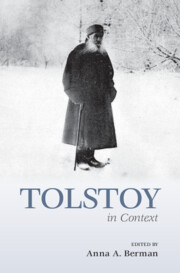Book contents
- Tolstoy in Context
- Tolstoy in Context
- Copyright page
- Contents
- Figures
- Notes on Contributors
- Preface
- Acknowledgments
- Note on Citations, Translations, and Transliterations
- Chronology
- Part I The Man
- Part II Russian Social and Political Contexts
- Part III Literature, the Arts, and Intellectual Life
- Chapter 16 Tolstoy’s Oeuvre
- Chapter 17 Peasant Schools and Education
- Chapter 18 Russian Philosophy
- Chapter 19 The Russian Literary Scene
- Chapter 20 European Literature
- Chapter 21 European Philosophy
- Chapter 22 Theater
- Chapter 23 Music
- Chapter 24 The Visual Arts
- Part IV Science and Technology
- Part V Beyond Russia
- Part VI Tolstoy’s Afterlife
- Suggested Further Reading
- Index
Chapter 17 - Peasant Schools and Education
from Part III - Literature, the Arts, and Intellectual Life
Published online by Cambridge University Press: 05 January 2023
- Tolstoy in Context
- Tolstoy in Context
- Copyright page
- Contents
- Figures
- Notes on Contributors
- Preface
- Acknowledgments
- Note on Citations, Translations, and Transliterations
- Chronology
- Part I The Man
- Part II Russian Social and Political Contexts
- Part III Literature, the Arts, and Intellectual Life
- Chapter 16 Tolstoy’s Oeuvre
- Chapter 17 Peasant Schools and Education
- Chapter 18 Russian Philosophy
- Chapter 19 The Russian Literary Scene
- Chapter 20 European Literature
- Chapter 21 European Philosophy
- Chapter 22 Theater
- Chapter 23 Music
- Chapter 24 The Visual Arts
- Part IV Science and Technology
- Part V Beyond Russia
- Part VI Tolstoy’s Afterlife
- Suggested Further Reading
- Index
Summary
Tolstoy occupies an important but often overlooked place in the development of educational thought, situated between the German pedagogical revolution of the eighteenth century and the proliferation of alternative education movements in the twentieth. Although initially inspired by the philosophy of Jean-Jacques Rousseau, Tolstoy’s educational experiments heralded a novel turn by rejecting educational theory as a foundation for the curriculum altogether. For applying any philosophy of education from above would unjustly impose and interfere with the lives of the Russian people. Instead, Tolstoy set out to facilitate the creation of the peasants’ own approach to schooling through dialogue with his pupils. This radical method has a close relationship with the development of Tolstoy’s literature and philosophy. His educational thought was well ahead of his time, and many of the ethical concerns he raised about mass education are still of pressing import.
- Type
- Chapter
- Information
- Tolstoy in Context , pp. 136 - 143Publisher: Cambridge University PressPrint publication year: 2022
- 1
- Cited by

